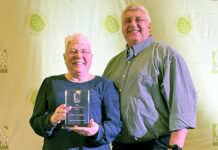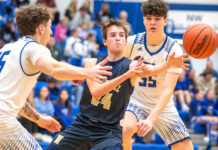Uncovering the revived Norwell tradition
By RICK SPRUNGER
When Norwell coach Eric Thornton affixed a bandana to a rim shorn of its net in the post-game celebration at Huntington North Saturday night, probably more than a few old-timers had to smile.
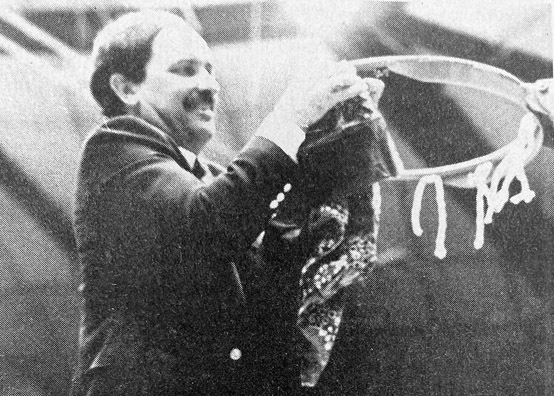
At the same time, a younger generation who had never seen or heard of such a thing must have scratched their heads in bewilderment — why tie a hanky to the rim?
But between 1972 and 1988, Norwell celebrated tournament championships by doing precisely that — which included sectional titles in 1972, ’73, ’75, ’78, ’80, ’81, ’83 and ’88.
It also included regional crowns in ’73 and ’88. It even encompassed Allen County Athletic Conference tournament championships in ’75, ’78, ’80, ’81, and ’88. It also included the girls’ sectional championships in ’76, ’77, ’82 and ’84, regional crowns in ’76 and ’77, and the ’77 semi-state title.
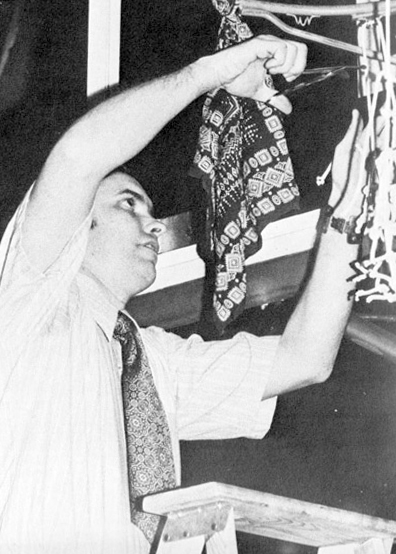
That’s a lot of bandanas.
But that old tradition had been disregarded, forgotten about, and gathering dust for 36 years until it was revived Saturday night. Thornton said that he was unaware of the tradition and was handed the bandanas by athletic director Kelby Weybright, who himself was given them by longtime fan and school board member Gene Donaghy.
But the question remains — why tie a hanky to the rim?
The answer: courtesy of the Norwell pep block.
In 1972, Norwell was in its fifth year of existence as a high school, and the students’ parents were still trying to adjust from their days at Lancaster, Ossian, Rockcreek and Union. These were also the days when basketball was king in Indiana, and winter in the community revolved around its team and the tournament.
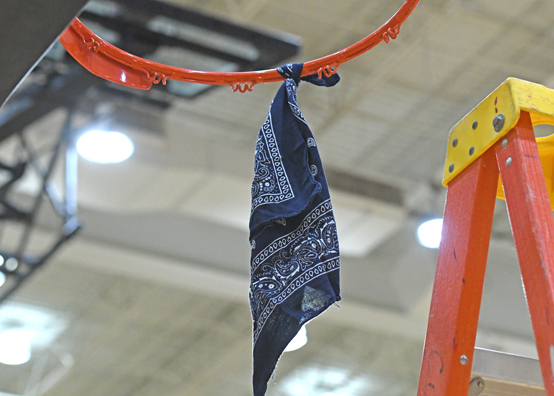
“We had a very strong pep block — girls and boys,” said Jerry Lewis, the Norwell head coach at the time, now living in Rochester, Minnesota. “We had a very close group of students, and we had a really good team. Everything just came together.”
While the sound of a girls’ pep block chanting in rhythm had become part of the background music of high school basketball, Norwell added a new chapter in the 1972 season with its boys’ pep block. It started in the ACAC tournament with flannel shirts and bandanas. Although the Knights did not win that tournament, it planted a seed.
When Norwell won the school’s first-ever sectional championship that year, it was time to celebrate. Particularly satisfying was the fact that the Knights won it with a convincing 63-46 victory over arch-rival Bluffton. That’s the same Bluffton team that had won four straight sectionals between 1967 and 1970 and probably would have won a fifth in 1971 but for a massive first-round upset at the hands of Southern Wells. The were back in the title game in 1972 — with a foot planted firmly on Norwell’s neck. Between 1968 and 1971, Bluffton had run over the Knights seven straight times by an average margin of 17 points per game.
“People today don’t realize the intensity of that rivalry,” said Rex Decker, longtime Norwell athletic director. “They started calling us farmers right from the beginning of the school in ’67-’68. They called us the “Farmers of Drywell High School,’ because a well spouts water, and a dry well spouts nothing. That was why the kids started wearing bandanas to the games.”
But things were different in 1972. Norwell had finally beaten Bluffton during the regular season, albeit by a narrow 54-52 score. In the sectional finals, however, the Knights left no doubt, pulling away from a tight game through three quarters to that lopsided 17-point margin of victory — and venting a lot of frustration in the process.
Making it equally delicious for Norwell was that the decisive win was accomplished on Bluffton’s own floor. In the postgame celebration, someone got the idea of tying a tiger tail, cut from the back of a stuffed animal, to the rim — Bluffton’s own rim — as a symbol of what had happened that night to its beloved Tigers.
“Someone stole a stuffed tiger from the Bluffton cheering section and cut the tail off,” remembered Kay (Fox) Schwartz (’73). She’s pretty sure she knows who swiped the soft toy but can’t confirm it. “I know who cut the tail off,” she chuckled. “They were waving it around during the game.”
“The Bluffton-Norwell rivalry was so fierce,” added Decker. “They wanted to hang (that tail) in Bluffton’s own gym just to spite them.”
Almost as an afterthought, someone else got the idea of making sure that Bluffton was reminded of who did it and produced a conveniently handy red bandana to tie to the rim as well. No one knew it at the time, but a tradition was being born.
But the heckling and the harassing about being farmers and coming from farm country wasn’t limited to Bluffton.
“(Norwell’s) glowing flannel shirts looked like rejects from a Sgt. Preston of the Yukon flick,” scoffed the Decatur Daily Democrat’s Eric Mann. “Added to the outfits were flashy red kerchiefs which, when waved, appeared suspiciously like rags usually tied to the back of slow-moving vehicles. My guess is that there are a number of deflagged farm vehicles in upper Wells County. Either that or someone is missing a pair of crimson long johns.”
Lewis got a kick out of hearing about that blurb in the Decatur paper and added, “We were being called ‘farmers’ by someone (other than Bluffton). Was it Bellmont? I was thinking it was Marion at the regional.”
According to Lewis himself back then, it was Marion. “Actually, the ‘farmer’ tag was stuck on us last year in the regional tournament at Marion when several of the fans made remarks to the effect that we were farmers,” he said in a preview to the 1973 semi-state a year later that ran in the Democrat under the headline “Norwell ‘farmers’ to battle ‘city-slicker’ (Northrop) Bruins.”
“I don’t know why we were being called that,” says Dennis Elick, a starter on both the ’72 and ’73 teams. “I didn’t live on a farm. None of us did. Well, maybe two of us. Gordon Wall might have lived on a farm, I think, and Mark Drabenstott did, too. But none of our dads were farmers, at least not full-time. Gordon’s dad worked at International Harvester. Drabenstott’s dad might have done some farming, but he was a teacher, too. We lived in Tocsin, and my dad worked for the railroad.”
The tag, of course, had nothing whatsoever to do with actually being a farmer. “Farmer” was teenage slang for hick or hayseed or unsophisticated. In other words: you’re not cool. Those would have been fighting words for any 17-year-old.
Farmers or not, Norwell very nearly force-fed Marion its own words before falling 58-57. A missed Marion free throw with 0:16 left gave the Knights a chance, but they missed two shots in the remaining time.
“We should have won that game,” insisted Elick about the near-miss against the eventual regional champion.
But instead of running away from the “farmers” tag, the Norwell students embraced it. After all, they’d been hearing it for five years. They called it, “Farmer Power.”
They came back for more the following season. The flannel shirts, the hats and the handkerchiefs, whether red or blue, became a sort of dress code. But there was more than just dress and hanky-waving, there were the yells — the testosterone-soaked whoops and hollers coming from the boys that were more provocative than anything the girls cooked up.
While the girls were producing standard-issue but innocuous stuff like “Re-bound that basketball,” the boys had other things in mind. If a particularly egregious call went against the Knights, fans might hear a bass-pitched “I’m blind, I’m deaf, I wanna be a ref,” or perhaps a menacing, “We got a rope, we got a tree, all we need now is a referee!” An opponent who made an exceptional play could expect to be serenaded with “Watermelon, watermelon, watermelon, rind; look at the scoreboard, see who’s behind!” And those were three of the tamer ones. There were others.
If those creative barnyard taunts and catcalls intended to get under someone’s skin, it worked.
“Some of the four- and five-letter words used in some of their cheers and songs should not be allowed,” huffed the Berne Witness after seeing its hometown South Adams team eliminated in the sectional finals and no doubt after hearing a rapid-fire, “We got a high school, we got a yell; we got a team that fights — like Helen in a high chair, we’re up there! Rah-rah-rah, zis-boom-bah, we’re going to beat you, ha-ha-ha!” “If the Norwell administration does not stop this kind of mockery, nonsense, and insults, then tourney officials should,” fumed the Witness. “Some of the chants and cheers in both the Adams Central and South Adams games have absolutely no place in high school basketball circles.”
The offending cheer was rattled off at drink-from-a-firehose speed to be almost indecipherable. Almost. But one word in it was clearly audible to the Witness. Or so the paper thought.
The question is: was “Helen” one word or two? The cheer makes sense either way.
Some, like Brian Schwartz (’73), remember “Helen in a high chair.” Others remember it differently. Some plead the Fifth — with a twinkle in their eye. And maybe that, after all, was the point: plausible deniability.
“I think there were maybe times when they were doing some things that maybe they shouldn’t have been doing,” said Lewis. “Our principal back then was Lex Dormire, and I know he had some anxious moments during games.”
Anxious moments for a principal equal a barrel of laughs for a bunch of fun-loving teens.
“They were very mischievous,” added Elick. “Nothing would surprise me coming from that bunch.”
In any event, while the Norwell students in the bleachers were bothering the South Adams faithful, the ones on the floor were taking care of business, ripping the Starfires 75-58 for Norwell’s second straight sectional championship. While there was no reason to fasten a tiger’s tail to the rim this time, the bandana came out anyway, along with a silent message, maybe not one directed at South Adams so much as toward Marion — we’re coming.
Even the adults got into the act. The News-Banner’s Gary Books reported seeing a doctor at the regional wearing bib overalls and other businessmen wearing bandanas instead of neckties with their sport coats. Lewis mentioned that to the Democrat, too. “I’ve seen well-known businessmen come to our games dressed in bib overalls, and when you can get that kind of support behind you, it can’t help but to make for a higher morale,” he said at the time.
Norwell did, indeed, come to Marion, ready to serve revenge up cold to their supposedly “big-city” tormenters. The only problem was that Marion wasn’t there. The Giants were ousted in the sectional by Madison-Grant, an embarrassment in itself. No matter. The Knights came, they saw, and they conquered, beating the team that Marion couldn’t along the way.
After the nets were cut down, someone climbed the ladder and proudly tied farmer’s bandanas to the rims — Marion’s own rims — in the same gym where Norwell’s players and fans had been so derided a year earlier. Just as Bluffton had “had it coming” last year, so Marion “had it coming” this year.
In the run-up to the semi-state a week later, a Fort Wayne News-Sentinel story on Norwell was headlined, “Farmers Are Coming,” though the author of the story was quick to point out that the majority of the students, “probably don’t know the difference between a Holstein and an Angus, or at least don’t care.”
Although the crop failed for Norwell that week, every tournament championship won by the Knights in the years that followed was celebrated by tying a farmer’s handkerchief, red or blue, to the rims after the nets were cut down. When the Knights won sectional and regional titles in 1988, a rally T-shirt was even made that depicted an empty rim with a bandana hanging from it.
But after that 1988 regional championship, nothing. Lewis retired after the 1989 season. When the new coach, Larry Lael, led his team to the Northeast Hoosier Conference tournament championship in 1991, the rims at the Coliseum were left conspicuously bare. When asked about it, Lael admitted that he was unaware of the tradition and pledged to restart it if his club won the sectional.
But none of Lael’s teams ever did. It was not until 1995 under the leadership of Bruce Ballinger that Norwell claimed another sectional title, seven years and two coaches removed from the previous one. No one thought to tie bandanas to the rims, and the tradition quietly died off.
But now, the Norwell girls have revived it. And hopefully, come this Saturday, the girls will be able, once again, to tie a farmer’s hanky ‘round the old iron hoop — after scoring what would be the biggest championship in the history of Norwell basketball.
sports@news-banner.com

